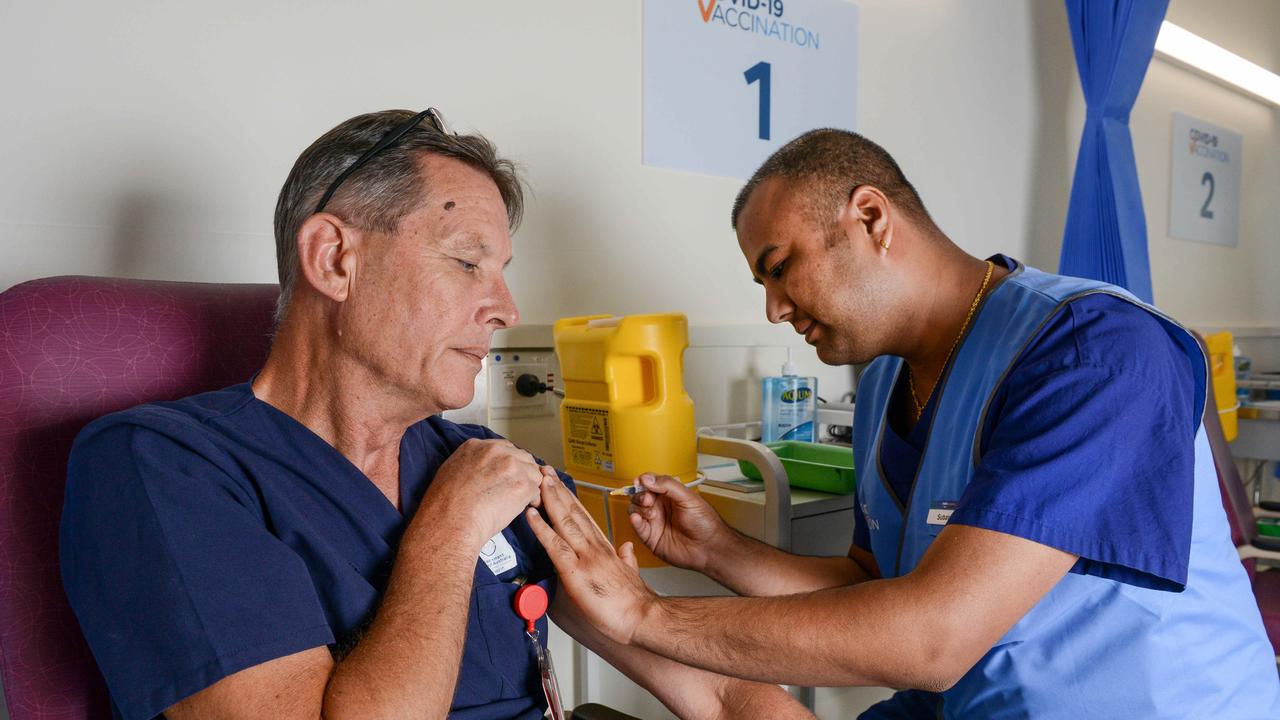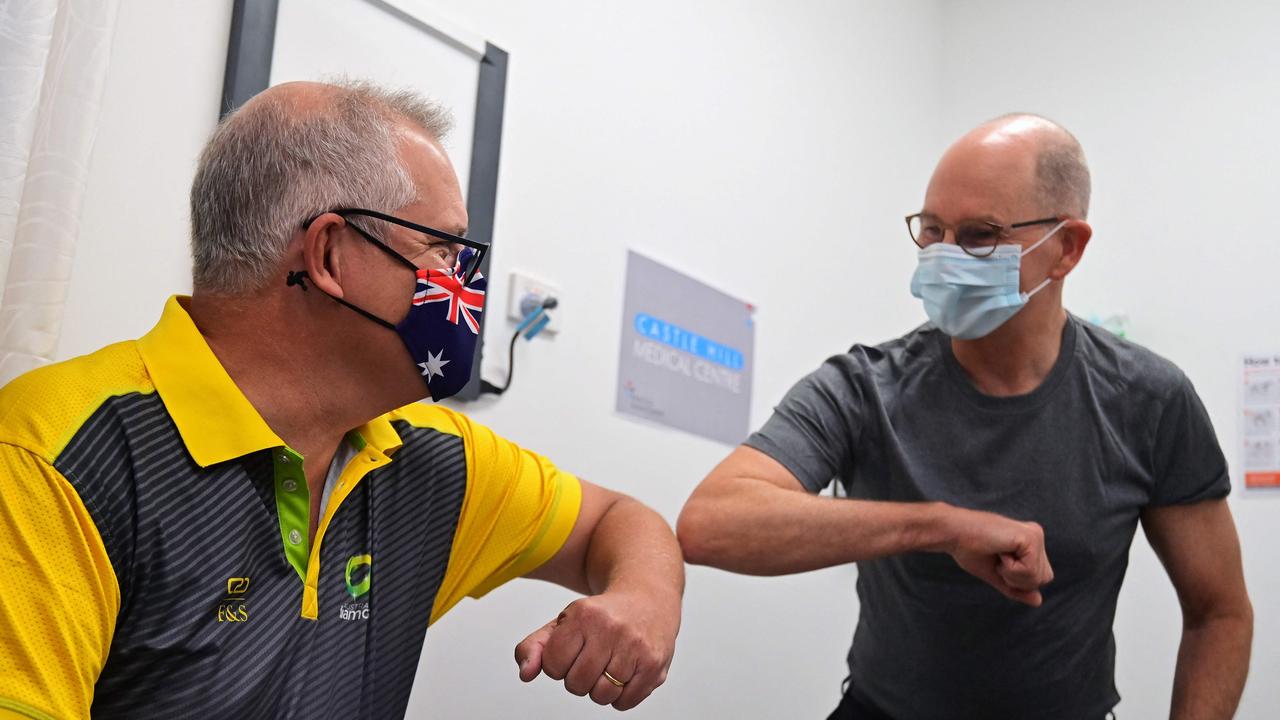Questions raised over AstraZeneca vaccine as Europe pauses roll out over safety concerns
An Australian professor says stopping the use of a COVID vaccine based on a “hunch” would only lead to more deaths.
When Australia’s coronavirus vaccine roll out kicked off last month, many believed there was finally some light at the end of the tunnel.
But the hotly-anticipated initiative has already been marred by fears over the AstraZeneca jab’s safety after a string of European nations suspended their own vaccination programs due to concerns over potential blood clotting issues.
That has sparked renewed worry Down Under, prompting calls from some camps for Australia to also hit pause while the matter is investigated.
RELATED: Brisbane lockdowns to continue

WHAT’S THE PROBLEM?
The issue came to a head this week after a slew of European countries, including Ireland, the Netherlands, Germany, France, Spain and Italy, halted their roll outs of the AstraZeneca vaccine.
Italy and France have since resumed the use of the vaccine.
The abrupt decision came after Austria reported serious adverse effects in two cases, including a 49-year-old nurse who died of severe blood coagulation 10 days after receiving the shot.
A 60-year-old woman in Denmark also died after developing a blood clot, and there are also reports of a death and three hospitalisations relating to blood clots in Norway.
WHAT’S EUROPE DOING?
So far, the roll out pauses across Europe are temporary and there is no indication the vaccination program will be abandoned altogether.
European Medicines Agency executive director Emer Cooke stressed there was no evidence to show it caused blood clots.
When asked if the vaccine was safe, she said: “It is the countries’ prerogative to do so. It is our responsibility to focus on the science associated with these risks and whether there is scientific evidence to show that they are causally related to the vaccines, and that’s what we are doing.”
“While the investigation is ongoing, we are still firmly convinced the benefits of the AstraZeneca vaccine in preventing COVID-19 with its associated risk of hospitalisation and death outweigh the risks of these side-effects.”
She also said that as of March 10 there were only 30 suspected cases of blood clotting from five million people vaccinated.
Some nations such as Italy and Romania have banned certain batches of the vaccine linked to the Austrian case, but at the moment governments have vowed the wider campaign will proceed as scheduled.
Authorities are currently investigating any potential links between the jab and adverse effects, and will provide updates as soon as possible.
POLITICAL STRIFE
However, the unfolding situation has already caused some political tension in Australia.
On Tuesday, outspoken Nationals senator Matt Canavan called for the Australian roll out to be paused alongside much of Europe, and that the “serious concerns” raised must be looked into.
“I don’t think all the capitals of Europe have been overtaken by anti-vaccine zealots. There is obviously legitimate concerns here,” he told Sky News.
“Given that we are a country where there is not really an imminent threat of coronavirus, I just don’t see how the risk of the vaccine outweighs, or is better than, suspending right now.”
“I just don’t think we can close our eyes to this evidence. The end goal has to be the health and safety of Australians.”
RELATED: Looming COVID crisis on our doorstep

But many other senior politicians insisted the vaccine is safe and the program would continue as planned, with Treasurer Josh Frydenberg repeating the World Health Organisation’s stance that there was “no evidence” the AstraZeneca vaccine had caused the blood clots.
“In the case of the United Kingdom, they have already distributed more than 12 million doses of the AstraZeneca vaccine, and they haven’t seen those trends or patterns across their community,” he told ABC RN on Tuesday.
“It is still the government’s intention to roll it out, as we’ve said.”
Chief Medical Officer Paul Kelly also dismissed Mr Canavan’s concerns, telling reporters this afternoon that: “There is no signal … of a link between AstraZeneca and blood clots.”
SHOULD WE BE WORRIED?
As the war of words continues, how concerned should ordinary Australians really be by the latest developments?
Firstly, it’s important to note the European Medicines Agency last week insisted there was “no indication” the clots were linked to the AstraZeneca vaccine, with Australian health authorities also maintaining the jab is safe.
That was echoed by the drug maker itself, which claimed there was no evidence of an increased risk of blood clots and other “thromboembolic” events among 17 million individuals who had already received the shot in the UK and the Eurpean Union.
Professor Bruce Thompson, from Swinburne University, said stopping the rollout based on a “hunch” would be the wrong call.
“As of today in excess of 350 million vaccine doses have been given around the world. For those who have received the vaccine, there have been no deaths or hospitalisations due to COVID,” Prof Thompson said.
“There has been a hunch that of the people who received the AZ vaccine, a few subsequently developed blood clots either as a DVT [deep vein thrombosis] or in their lungs. At this stage, there is no evidence at all that these are associated with being vaccinated. To stop a vaccination based on a hunch will lead to an increase in COVID deaths.”
And the World Health Organisation has also weighed in, with WHO spokeswoman Margaret Harris saying no causal link had been established between the “excellent” shot and the blood clot cases that have emerged.
“It’s very important to understand that, yes, we should continue to be using the AstraZeneca vaccine,” Ms Harris said.
In an article penned for The Conversation, Australian health experts Nigel William Crawford, Hazel Clothier and Jim Buttery wrote that there would always be some who experienced a thromboembolic event at some point in their lives, but insisted that so-called “background rate” wasn’t necessarily tied to any particular factor, including a vaccine.
“Unfortunately, about 17,000 Australians suffer a thromboembolic event each year,” they wrote.
“So when vaccinating many millions of people, we expect a very small number of them to develop a blood clot that coincidentally occurs not long after they’ve received a vaccine.
“This doesn’t mean it was caused by the vaccine.”
That sentiment was echoed by Swinburne University’s dean and professor School of Health Sciences Bruce Thompson, who is also the president of the Thoracic Society of Australia and New Zealand.
RELATED: How the vaccine will change our lives

“As of today in excess of 350 million vaccine doses have been given around the world. For those who have received the vaccine, there have been no deaths or hospitalisations due to COVID,” Prof Thompson said in a statement.
“There has been a hunch that of the people who received the AstraZeneca vaccine, a few subsequently developed blood clots either as a DVT [deep vein thrombosis] or in their lungs. “At this stage, there is no evidence at all that these are associated with being vaccinated. To stop a vaccination based on a hunch will lead to an increase in COVID deaths.”
And Paul Griffin, the director of Infectious Diseases at Mater Health Services and Associate Professor of Medicine at the University of Queensland said he believed the situation in Europe was an “over-reaction”.
“While this is perhaps how these countries prefer to respond, we should make sure we don’t overreact in our country and that we continue to make evidence-based decisions based on the available data at hand,” he said.
“This vaccine has proven very safe and effective in large clinical trials.
“In fact in clinical trials now exceeding 60,000 participants, some of these events were observed in low numbers but there were actually fewer in the vaccinated group than in those that had not received the vaccine.”
So far, there have been no reports of blood clots among those who have already received their first vaccine dose in Australia.




